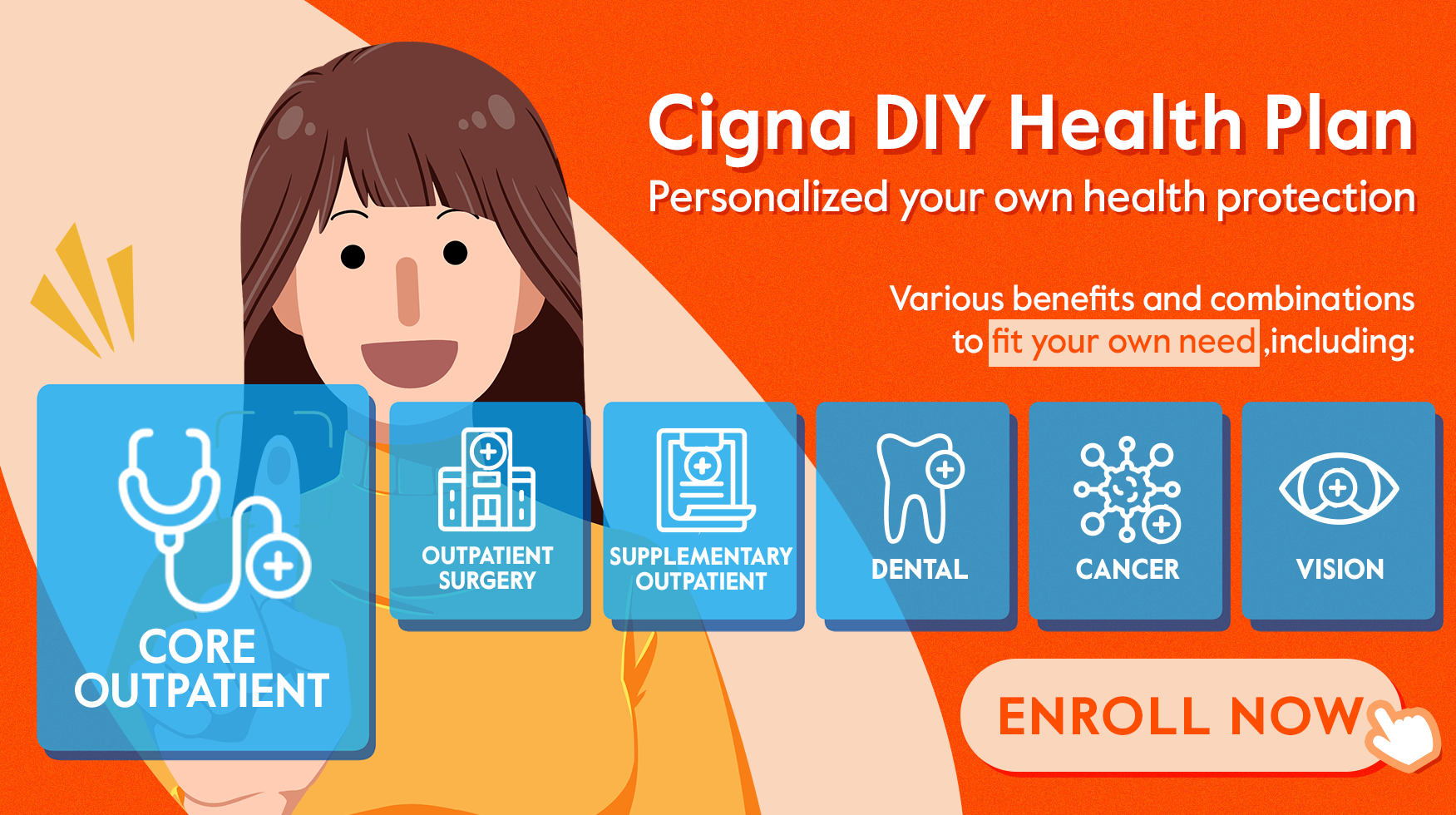When mentioning common age-related eye diseases, you may refer to cataracts, glaucoma, dry eyes, etc. However, age-related macular degeneration is also a major vision problem that ranks third among all eye diseases. Once diagnosed with macular degeneration, you will have a blurry and distorted vision. For severe cases, it may result in a permanent loss of vision. In this article, Cigna Smart Health explains this vision problem's causes, symptoms, and treatments.
Types of Macular Degeneration
Macular degeneration happens when the small central portion of your retina, called the macula, wears down, gradually deteriorating your central vision with damage to the light-sensing nerve tissue. Eventually, it leads to a permanent loss of central vision. There are two main types of age-related macular degeneration: dry and wet forms.
1. Dry Macular Degeneration
Around 90% of cases belong to dry macular degeneration. Patients with this form may have yellow deposits, called drusen, in their macula. When drusens grow bigger and become numerous, they may interfere and damage the light-sensitive cells on your macula, causing a dimmed and distorted vision. As the condition gets worse, your macular function deteriorates and results in a gradual loss of central vision. It may also develop into wet macular degeneration.
2. Wet Macular Degeneration
Wet macular degeneration is caused by choroidal neovascularization, the overgrowth of blood vessels underneath your macula. If these blood vessels are damaged, they leak blood and fluid into your macula. The light-sensitive cells on your retina are therefore destroyed, and you may also have blind spots and a loss of central vision. These blood vessels and their bleeding eventually form a scar, leading to a permanent loss of central vision in a short period of time.
Causes of Macular Degeneration
Aged-related macular degeneration is common among the elderly. Apart from aging, the below factors also contribute to this eye disease.
- Smoking
- Overweight or obesity
- High blood pressure
- High cholesterol level
- Cardiovascular diseases
- Being anxious and stressed
- Lack of exercises
- A family history of eye diseases
- Excessive exposure to sunlight
- Prescription of several medications, such as antipsychotics and malaria drugs
Symptoms of Macular Degeneration
Early-stage macular degeneration includes blurry and unclear vision, being sensitive to light, etc. As the condition deteriorates, you may have a distorted vision and dark or black spots in the center of your vision. Below are some common symptoms of macular degeneration.
- Reduced central vision
- Visual distortions
- Broken and blurry images
- Missing, or warped images
- A well-defined blurry spot or blind spots in your field of vision
- Being sensitive to lights
- Illusion of unexisting lights, shapes or colors
How Is Macular Degeneration Diagnosed?
Without proper treatments, macular degeneration deteriorates continuously and leads to blindness. If you observe the above symptoms, you should seek medical advice and receive a detailed eye examination at your earliest advance. Below are the common tests for the condition nowadays.
- Examination of the back of your eye
- Fluorescein angiography
- Optical coherence tomography
1-min Macular Degeneration Self-Examination - Amsler Grid
Besides, you can also conduct a one-minute eye examination by yourself through looking at an Amsler grid. Please see the following self-testing steps for macular degeneration.
- If you have presbyopia or short-sightedness, please wear your glasses for the tests
- Put the grid table about 30 cm away from your eyes
- Cover your left eye and look at the black dot in the center of the grid with your right eye
- Cover your right eye and repeat the above step
If you see distorted, empty and blurry images or even scattered block spots, you may have macular degeneration and should go to the hospital for a detailed examination.
 |
 |
| If you have macular degeneration, you will see a distorted image, have a blurry central vision or even black shadow. | A typical Amsler grid shows checkerboard-like straight lines. |
Treatments of Macular Degeneration
At the moment, there is no cure for macular degeneration. Still, you can take vitamins and other supplements to slow down the deterioration or keep you from losing too much of your vision. For wet macular degeneration, your doctor may adopt laser therapy, injection, and photodynamic therapy to treat the condition.
1. Photodynamic Therapy
Your doctor injects a light-sensitive drug into your bloodstream, and it is absorbed by the abnormal blood vessels. Your doctor then shines a laser into your eye to trigger the medication to damage those blood vessels and control the condition from deteriorating. However, the therapy cannot recover your vision loss.
2. Injection Treatment
Your doctor may inject two types of medications into your affected eye, namely ‘intravitreal injection of anti-VEGF’ and ‘steroid intravitreal injection.’ The former can control the condition of wet macular degeneration and prevent further deterioration, while the latter can lessen the retina damage done by the overgrown blood vessels.
3. Photocoagulation
During photocoagulation therapy, your doctor uses a high-energy laser beam to seal abnormal blood vessels under the macula. The laser causes scarring that can create a blind spot, but the procedure is used to stop the vessels from bleeding with the aim of minimizing further damage to the macula. Since the laser may destroy surrounding tissues, there is a risk of vision loss or blindness for those receiving this treatment
The costs of the above macular degeneration vary. Using injection treatment as an example, the cost per injection is from HK$7,700, depending on the medical institution. The best time for receiving macular degeneration is the first three months of onset. Early intervention can help stabilize the condition and have your normal vision back.
Prevention Tips for Macular Degeneration
To effectively prevent macular degeneration, you should practice good habits and adjust your food options to protect your vision. Below are some lifestyle tips that help lower your risk for macular degeneration.
- Quit smoking
- Eat more leafy green vegetables
- Consume more fruits and nuts
- Have sufficient zinc and vitamins
- Control your blood pressure and cholesterol levels
- Avoid exposure to ultraviolet radiation and blue light
Moreover, the screen light from your mobile phone can also directly damage the eye macular area, leading to macular hemorrhage, glaucoma, and other eye diseases. Even though you are young, you still need to be aware of the effects brought by macular degeneration.
Weakened vision not only adversely affects your daily life, but also lowers your self-care ability. Cigna DIY Health Plan enables you to freely choose from various protection benefits to customise your plan to your individual needs, including dental coverage, regular oral check-up, treatment cost and emergency. Tailor your health coverage now.
Source
- Aged Related Macular Degeneration (ARMD)
- What is macular degeneration?
- Aged Related Macular Degeneration
- 黃斑點病變3大治療方法及7個預防貼士
© Cigna Healthcare 2023
Information provided in this article is intended for health and fitness purposes only and is not intended for use in the diagnosis of disease or other conditions, or in the cure, mitigation, treatment or prevention of disease (see Terms & Conditions for details). Any health-related information found in this article is available only for your interest and should not be treated as medical advice. Users should seek any medical advice from a physician, especially before self-diagnosing any ailment or embarking on any new lifestyle or exercise regime. Any information contained in this article may not be suitable, accurate, complete or reliable. Cigna Healthcare accepts no responsibility for the content or accuracy of information contained on external websites or resources, or for the security and safety of using them. "Cigna Healthcare" and the "Tree of Life" logo are registered trademarks of Cigna Intellectual Property, Inc. in the United States and elsewhere, licensed for use. All products and services are provided by or through operating subsidiaries, and not by The Cigna Group.




